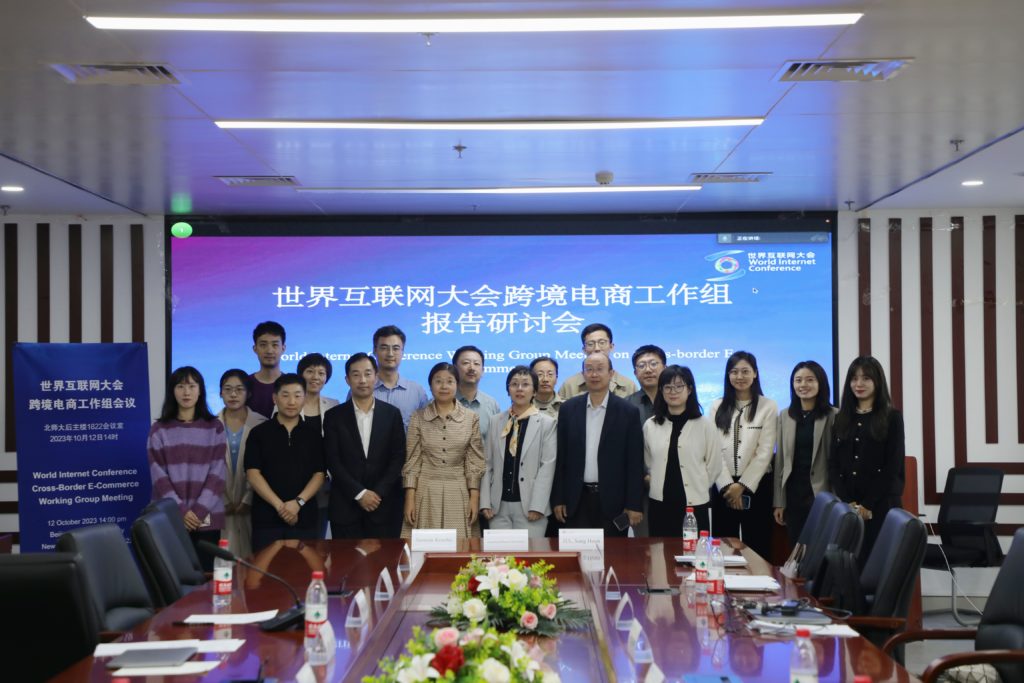September 9, 2024 at 8:33 am
· Filed under Archives, Conferences, Intellectual Property, Internet Governance, Legal News
2024年9月6日上午,由北京师范大学协办的“加快构建中国特色知识产权话语体系”学术研讨会在京顺利举办。会议由中国经济社会理事会主办,中国知识产权研究会承办。来自全国政协、国家知识产权局、北京大学、清华大学、北京师范大学等单位的领导和专家,同来自全国各地的数百位专家、学者及媒体记者,以“线上+线下”的方式同步参与。整场研讨会分“主旨演讲”和“分会场”两大版块,围绕着中国特色知识产权话语体系的理论基础、社会基础、生态体系、治理体系、智库体系、思路举措、人才培养等热点话题,同堂共议、分享智慧。

中国经济社会理事会副主席舒启明,国家知识产权局副局长、党组成员卢鹏起,中国科学院院士、中国知识产权局研究会副理事长何满潮,北京大学国际知识产权研究中心主任、中国知识产权研究会副理事长易继明,中国科学院大学知识产权学院院长兼公共政策与管理学院副院长马一德,全国政协委员、中国经济社会理事会理事、中国政法大学商学院院长商文江,北京市电子商务法治研究会副会长、北京师范大学法学院教授薛虹,国家知识产权局人事司司长、中国知识产权研究会常务理事张志成等6位嘉宾,分别以《构建中国特色知识产权话语体系的理论基础和社会基础》《构建知识产权创新生态体系》《中国自主知识产权话语体系的理想和现实》《关于知识产权保护与使用关系的几点思考》《数字贸易知识产权国际规则的中国方案和中国智慧》及《打造中国特色知识产权人才培养体系和智库体系》六大主题,应邀作主旨演讲。全国政协常委、副秘书长,民进中央副主席,中国经济社会理事会副理事长、常务理事何志敏和中国知识产权研究会秘书长谢小勇,先后担任主会场的主持人。
薛虹教授在主旨发言中提出,数字贸易作为一种新型的全球化贸易,其贸易主体、贸易内容和贸易方式都发生了显著变化。知识产权也面临着贸易体量激增、保护难度加大、执法措施更新的新形势和新挑战。中国《电子商务法》在知识产权保护领域做出了突破性的探索和实践,推动了权利保护从敌对到合作、平台治理从商业决策到多方参与、平台责任从被动追责到预防与问责相结合的深刻转变。中国的《电子商务法》对国际法产生了深远影响。,特别是在特定数字平台的知识产权保护措施和大型平台的责任方面,体现了中国法律的创新性。她希望中国的实践者,主动跟进平台变化趋势,及时总结经验,参与国际治理,融入国际体系。各位专家的主旨发言得到与会专家的高度赞赏,将刊登在《中国经济社会论坛》公开发行。本次会议线下座无虚席,线上累计6000余人观看,中国企业报、学习强国等权威媒体跟踪报道,取得了圆满成功。
当天下午,北京师范大学主办的学术研讨会分会场——“知识产权国际话语体系构建思路与举措”举行。北京师范大学法学院薛虹教授做开幕致辞,并对列席专家表示热烈欢迎。 互联网域名系统国家工程研究中心副总经理冯硕以“掌握顶级域名关键资源,迎接国际网络知识产权新趋势”为题进行了主旨发言,向与会嘉宾介绍了全球知名企业顶级域名的管理应用实践。薛虹教授做点评交流,强调顶级域名在企业战略中的重要性,特别是在争取关键互联网资源的国际话语权、数字资产管理和数字品牌保护方面的作用。中国企业应该认识到这一点,并采取积极措施在域名系统申请和利用品牌顶级域名,以提升其在全球市场中的竞争力。
西南政法大学民商法学院孙山副教授发言题目是“全球知识产权治理中的“过度财产化”现象及其应对”。孙副教授从现象到本质从成因到应对,对全球知识产权治理中的过度财产化问题进行了回应。《科技与法律(中英文)》编辑部主任,中国科学技术大学的许绍定老师在交流环节中提出“过度财产化”的“过度”与“适度”该如何把握这一疑问。
北京大学国际知识产权研究中心研究员、《中国科技法律评论》执行主编、天津大学法学院副教授李春晖以“跨境电子商务知识产权争议解决的国际协调和积极管辖”为题做主旨发言。李副教授重点探讨了新时代对积极管辖的需求,认为应多路径、综合性地解决跨境电子商务知识产权争议问题,以实现知识产权全球化、数字化,司法全球化、数字化的展望。许绍定老师认可该选题的价值性,并从审稿人的角度提出疑惑。
北京科技大学知识产权研究中心副教授、研究生导师王润华以“知识产权国际战略——竞争与合作并进”为题进行发言。王副教授结合自身国际访学经历,从创新与竞争生态、知识产权法解读与应用及知识产权政策意义三个方面阐述生成式AI的影响。她认为生成式AI应在竞争下坚持独立自主的可持续性发展,同时发挥中国的大国作用,与国际治理规则协同并进。随后中国人民公安大学施小雪老师进行点评交流。施老师认为应该从深化知识产权保护、防止知识产权滥用两个方面加强平衡,以确定这样一个合理的保护水平。 北京工业大学文法学部讲师涂靖以“知识产权领域国际合作与竞争”为题做主旨发言。他深入分析知识产权国际合作的单边化、僵硬化、迟滞化和失衡化等关键问题,四维系统的分析企业风险。中国政法大学民商经济学法学院博士后刘云开以“中国知识产权法的域外适用”为题深入探讨了中国知识产权法在国际法律环境中的适用性及其重要性,强调了维护国家安全和参与全球知识产权制度竞争的重要性,为理解中国在知识产权保护方面的立场提供了对比视角。随后北京师范大学法学院博士生张玮琛结合自身经历学习发表了见解交流。
本次会议线上线下同步进行,来自全国政协、国家知识产权局、北京大学、清华大学、北京师范大学、互联网域名系统国家工程研究中心等单位的专家学者齐聚一堂,助力构建知识产权国际话语体系。本次会议扩大了北师大及法学院的学术影响力,获得圆满成功。

Permalink
April 19, 2024 at 2:19 pm
· Filed under Archives, Conferences, Internet Governance, Legal News
2024年4月17日,数字丝路跨境电商研修班在西安开班。世界互联网大会秘书长任贤良出席研修班并致辞。数字丝路跨境电商研修班致力于推动全球跨境电商的繁荣发展和该领域数字人才能力的全面提升。数字丝路跨境电商研修班通过聚焦跨境电商业务中的热点问题,为广大学员提供政策、知识、技能的相关培训,赋能数字化转型,助力学员共享数字经济发展红利,把握全球跨境电商未来新机遇。
来自俄罗斯、埃及、卢旺达、埃塞俄比亚、津巴布韦、巴基斯坦、塔吉克斯坦、缅甸、泰国等27个国家的政府部门官员、金融等行业代表、企业管理层、高校教师、社会组织代表参加。数字丝路跨境电商研修班邀请来自联合国国际贸易中心、亚太经济合作组织电子商务工商联盟专家委员会、联合国亚太无纸化贸易专家网络咨询委员会、跨境电子商务综合试验区、世界电子贸易平台、高校、跨境电商领域代表性企业的代表组成授课专家团队。

薛虹教授作为主讲专家在开幕式后为各国学员讲授跨境电子商务国际规则体系,受到学员的一致认可和强烈肯定。其他专家专家围绕全球跨境电商发展趋势、跨境电商高质量发展新常态、中国推进跨境电商高质量发展的实践、构建全球跨境电商基础设施的实践、“阳光化”为中企出海保驾护航——从合规到一站式出海综合诊断服务、国际供应链创新助力企业全球化发展等议题进行授课。
数字丝路跨境电商研修班旨在为全球数字经济的繁荣发展培养一批具备全球视野、通晓国际规则、善于多边合作的复合型人才,必将助力深化与共建“一带一路”国家和地区在网络空间的深入交流和务实合作,搭建跨境电商交流互鉴平台,与全球分享经验,使数字技术的红利惠及更多国家。
Permalink
January 25, 2024 at 11:39 am
· Filed under Archives, Internet Governance, Legal News
2024年1月24日,薛虹教授接受《人民法治》副总编辑采访,就2023年11月27日滴滴平台系统崩溃事件进行法律分析。薛教授谈到,在数字经济中,数字平台是社会经济文化生活的中心和枢纽。大型数字平台的正常运行甚至对整个社会生产和人们日常生活有很大的影响。数字平台的运行依赖于复杂的网络信息系统的支撑。网络系统丧失全部或部分功能,俗称系统崩溃。内外因都可能导致数字平台运行发生严重故障、系统失灵等网络安全事故。2023年1127滴滴事件中,滴滴承认系由“底层系统软件发生故障”造成,证明该事故原因是滴滴网络信息系统自身存在安全缺陷、系统漏洞。除了数字平台的内因,计算机病毒、网络攻击、网络侵入等网络犯罪或者火灾、地震、海啸等自然灾害也是造成网络安全事故的原因。例如,向目标系统恶意提交超大数量的服务请求造成系统过载、瘫痪的网络攻击,就是典型的情况。当今的数字平台(特别是大型平台)都已经具备了比较强大的防范网络犯罪、灾害的能力,达到系统崩溃程度的严重网络安全事故一般是内外因共同作用形成。例如,病毒、入侵等外因触发了系统安全缺陷、漏洞,造成代码运行、用户界面出现大规模、持续性错乱的严重后果。
我国法律法规对数字平台的网络安全保障义务有明确的规定,在行政法律体系中进行比较充分全面的监管。所有运营网络或者通过网络提供服务的企业都必须采用国家强制性技术标准,采取技术措施和其他必要措施,保障网络安全、稳定运行,有效应对网络安全事件,防范网络违法犯罪活动,维护网络数据的完整性、保密性和可用性。所有网络运营者都应制定网络安全事件应急预案,及时处置系统漏洞、计算机病毒、网络攻击、网络侵入等安全风险。发生危害网络安全的事件时,网络运营者应立即启动应急预案,采取有效补救措施,防止危害扩大,并及时向社会发布与公众有关的警示信息,按照规定及时告知用户并向有关主管部门报告。违反上述法定义务的数字平台将受到国家网信部门会同主管部门的行政处罚。滴滴事件中,平台补救措施部到位,公众警示不及时,亦未积极调查事故原因及公布详细的事故调查结果,草草了事,并不符合有关的法律要求。
交通运输部、国家网信办、公安部等八部委组成的交通运输新业态协同监管部际联席会议将滴滴出行、货拉拉、美团打车等列为“交通运输新业态平台公司”,并对其进行了多次提醒式约谈,要求强化安全生产和应急处置能力,维护司机和消费者合法权益。如果滴滴等平台公司的规模已经发展到了影响客货运市场、公共服务等重要领域的国家安全、公共利益的程度,应当按照《网络安全法》规定的关键信息基础设施进行监管。此类平台必须履行各项法定义务,严防系统丧失功能或信息泄露发生,采购网络产品和服务须接受网络安全审查,定期进行安全评估,进行网络安全应急演练,提高应对网络安全事件的水平和协同配合能力。
依据《电子商务法》的规定,电子商务平台经营者应当采取措施,保证网络安全稳定运行,有效应对网络安全事件,保证电子商务交易安全。平台用户的合法权益因平台网络安全事故受到损害的,有权依据《民法典》等法律的规定,获取相应的法律救济。但是,用户追究平台的侵权责任,在举证责任方面面临较大的困难,难以证明网络安全事故完全系平台网络系统造成。在电子支付等特殊领域,举证责任倒置,用户追究平台责任的能力增强。例如,在滴滴事件中,结算系统出现故障,导致结算记录错误,用户遭受实际损失的,有权依据《电子商务法》的规定,由滴滴承担错误支付或者非授权支付的赔偿责任,除非滴滴能证明错误支付非自身原因造成或者非授权支付是因用户原则造成。
用户与数字平台之间订立了用户协议,存在合同关系。用户因平台网络安全事故遭受损失的,也可以依据用户协议追究平台的违约责任。但因用户协议中大部分条款是基于平台规则所形成的格式条款,平台一般事先规定了大量免责或者责任限制的事由,使用户难以获得赔偿。在滴滴事件中,即便平台承认网络安全事故系因网络信息系统自身问题造成,也仅给予用户10元红包了事,显然是用户协议中责任限制条款在发挥作用。而且,用户协议格式条款不仅规定了赔偿用户实际损害的限额,而且排除了平台对用户间接的、预期的、偶然的、附带等损失的赔偿责任。因此,用户因无法上班的误工损失、无法回家的酒店费用都无法获得违约赔偿。更有甚者,某些平台的用户协议规定了采用仲裁的方式解决与用户的争议的格式条款。因仲裁程序费用较高,用户面临小额争议望而却步,进一步缩小了用户获得赔偿的可能性。市场监督管理部门及主管部门有必要强化对平台规则和用户协议的监管,对违反《电子商务法》的规定,不遵循公平公正的原则制定平台规则和用户协议的行为予以制止和处罚。
平台网络安全事故很可能导致大量消费者的个人信息(包括支付账户等敏感个人信息)泄露,使个人信息权利受到损害。依据《个人信息保护法》,数字平台作为个人信息处理者,侵害消费者个人信息权益造成损害,不能证明自己没有过错的,应当赔偿消费者受到的损失或者个人信息处理者因此获得的利益;损失和获利难以确定的,根据实际情况确定赔偿数额。数字平台面临用户索赔的情况将越来越多。平台出于风险控制、可持续性发展的目的已经比较普遍地购买了责任保险。随着保险理赔的范围扩大,用户因平台系统崩溃得到赔偿的机会也可能增加。
Permalink
October 25, 2023 at 3:13 pm
· Filed under Archives, Conferences, Internet Governance, Legal News
薛虹教授作为世界互联网大会跨境电子商务工作组副组长,主持起草了工作组主要成果《跨境电子商务国际规则体系发展研究报告》。报告将于2023年11月第十届世界互联网大会期间,由主要领导向国内外发布。在大会召开之前,薛虹教授接受了光明日报记者的专访,详细阐述了报告的主要内容和重要意义。

记者问:目前发展跨境电商主要面临那些问题和挑战?我们了解到,世界互联网大会国际组织成立了跨境电子商务工作组,您作为工作组副组长,牵头起草了《跨境电子商务国际规则体系发展研究报告》,《报告》提出了一系列促进跨境电子商务业务发展、推动完善跨境电子商务国际规则的立场主张与行动,请您简要介绍一下。
薛教授:世界互联网大会国际组织密切关注全球经济发展。网络信息技术支持下的新型商品、服务、知识产权贸易,成为世界经济发展新动能。研究跨境电子商务国际规则目的是为了促进跨境电商发展,提供贸易效率,降本增效,减少摩擦、协调监管、发展便利化措施的解决方案,特别是促进新兴市场国家(数字化转型中国家)、中小微企业、数字平台的发展。主要问题:各国家或地区数字经济发展不均衡,在基础设施、经济发展水平、国内产业结构、国际贸易参与能力方面差别很大,各国以安全、国内市场保护等原因加强了对跨境电子商务的监管,各国政策法律监管不协调导致企业合规成本增加、贸易风险增大。印度下架我国多款APP,印尼限制Tiktok直播电商都是这方面的例证。报告提出,各国相关政策法律环境有待完善,贸易便利化措施有待加强,国际贸易体制应当发展,适时增加新规则。报告提出了有关的主张,即:发展国内、跨境的便利化措施,完善消费者保护、个人数据保护、人工智能监管等方面的政策法律环境,构建跨境电子商务平台治理、争议解决、知识产权规则,加强中小微企业、新兴国家国际参与能力建设。报告还提出了有关的行动计划,即:通过多渠道、多方面参与,加强国际交流、国际谈判方面的合作,推动新国际规则的形成。
记者问:《报告》体现了促进跨境电子商务发展的贸易便利化创新举措,提炼了最佳实践。当前,数字化与互联网深刻地改变了国际贸易的环境、形式与价值链构成,使全球化的市场成为更为有效的信息系统。请您简单介绍目前国际上关于跨境电商贸易便利化的部分举措?并请您结合这些做法谈一谈,发展跨境电商对国际交流和贸易有哪些积极影响?
薛教授:《报告》着重研究数字贸易进出口监管措施及其创新。电子商务需要数字化、无纸化、智能化、高效化的进出口监管。我国国内便利化措施,例如国家数字单一窗口已经取得加大的进展,跨境电子商务综试区成效显著,我国《电子商务法》为监管创新提供了法律依据。在国际层面,针对跨境电子商务的便利化措施还在发展中,合同、物流、支付等贸易文件的无纸化已经比较普遍,但原产地证书、进出口许可证等监管文件的无纸化还有一定距离,跨境承认电子形式的数据和文件的国际法律框架已经建立。《报告》还提出发挥跨境电子商务平台的作用,使中小微企业获得便利化的支持。
记者问:今年是世界互联网大会乌镇峰会的第十年。一直以来,世界互联网大会以构建网络空间命运共同体理念为指引,深入开展包括数字贸易和跨境电商等领域的网络空间国际交流合作,不断取得积极的成果。就您关注的角度而言,请您谈一谈如何理解“构建网络空间命运共同体”这一理念的意义?请您为乌镇峰会十年送上一份祝福。
x薛教授:世界互联网大会坚持各方参与的精神,秉承尊重网络主权、维护和平安全、促进开放合作、构建良好秩序的四项原则,在国际贸易开放合作、网络经济创新发展、凝聚互联网治理共识、全球经济互惠共赢,全世界繁荣安全方面作出突出贡献。祝愿国际论坛十年有成,跨境电商繁荣发展 未来可期!
Permalink
October 13, 2023 at 2:23 pm
· Filed under Archives, Conferences, Internet Governance, Legal News
2nd World Internet Conference Working Meeting held at BNU to Review the Draft Report on Cross-border E-Commerce
2023年10月12日,世界互联网大会跨境电商工作组报告研讨会在北京师范大学法学院成功举行。来自跨境电商企业及在跨境电商领域具有坚实研究基础和丰富国际合作经验的专家参加了此次会议,围绕《跨境电子商务国际规则体系发展研究报告》(以下简称“报告”)的主要内容展开了深入的交流与讨论。世界互联网大会发展研究部负责人康彦荣介绍了报告起草过程。她表示,世界互联网大会跨境电商工作组6月底成立,围绕跨境电商业务发展、规则制定实施、促进贸易便利化的最佳实践等开展了实地调研,基于调研成果、工作组成员提供的实践材料及国际专家反馈,工作组形成了报告(征求意见稿)。世界互联网大会跨境电商工作组副组长北京师范大学教授薛虹介绍了《跨境电子商务国际规则体系发展研究报告》的主要内容。她表示,报告以国际化视野,从创新、前瞻、中立的角度,研究了跨境电商贸易便利化措施的最新发展,及适应跨境电商发展的法律政策环境,并总结了最佳实践和相关案例,提出丰富与发展相关国际经贸规则与实践的倡议,提出加强多渠道交流、搭建最佳实践交流平台、促进国际规则制定等工作组下一步工作构想。

在研讨会的交流讨论环节,来自阿里国际、菜鸟、抖音、京东、拼多多、蚂蚁、中国信通院等企业及智库代表,APEC电子商务工商联盟、中国国际电子商务中心、北京市互联网域名系统工程技术研究中心、上海市商务发展研究中心、北京市法学会电子商务法治研究会、浙江工商大学等跨境电商领域的专家学者,及来自意大利、韩国和泰国的专家,对报告的主要内容进行了专业的、深入的分析与探讨。参会代表一致认为,目前的报告内容丰富、具有创新性,提出的建议可操作性、可推行性强,肯定了报告对推动跨境电商发展、支持全球数字经济转型,开展能力建设及完善法律政策保障等方面具有巨大价值。 北师大法学院博士生张玮琛、杨灵丽及法律硕士研究生参加会议。
世界互联网大会跨境电商工作组将在2023年乌镇峰会期间发布该报告,并以此为起点,以跨境电商工作组为平台,积极推动跨境电商领域国际合作,凝聚更广泛的发展共识,促进跨境电子商务健康可持续发展。
Permalink




